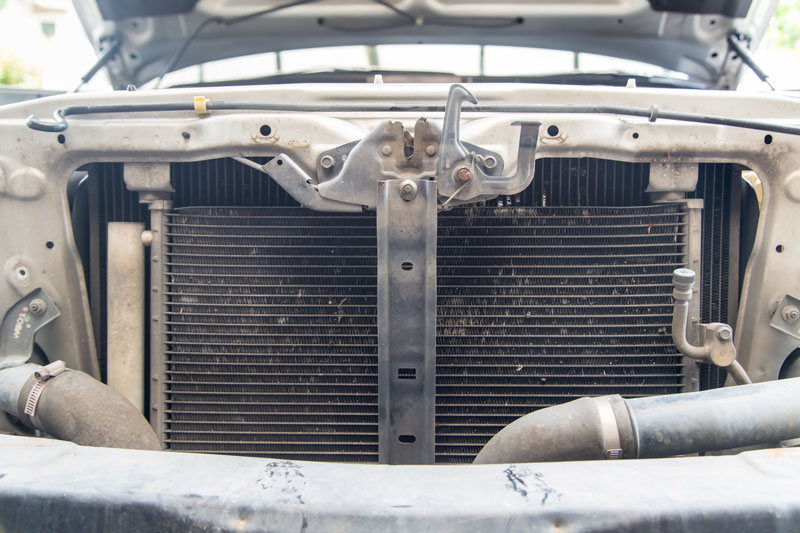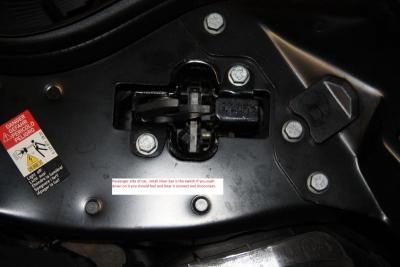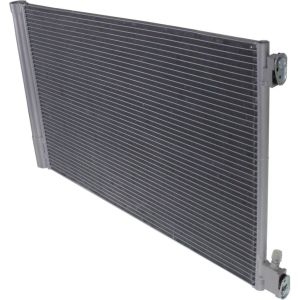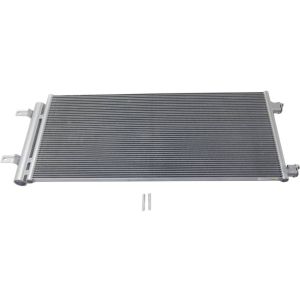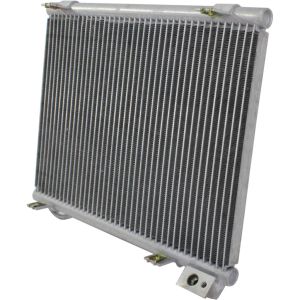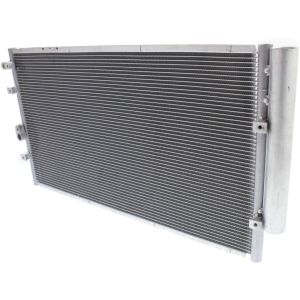You've noticed your car's AC isn't as cold as it used to be, and you've traced the problem to a faulty AC condenser. Now, you're faced with the task of replacing it. It's not a task for the faint-hearted, but with the right tools and a bit of patience, you can do it yourself.
You don't need to be a mechanic, but is this a job you should tackle? Stick around and we'll explore the process, the challenges, and the satisfaction of fixing your own AC system.
Key Takeaways:
- Begin by preparing the vehicle and identifying any obvious issues with the AC condenser.
- Ensure safety by disconnecting the power source to avoid any electrical hazards.
- Carefully follow a step-by-step process to remove the faulty condenser and install the new one.
- If doing it yourself, be ready for regular maintenance and avoid errors to prevent higher costs.
- Seek professional help if the task seems too complicated or if problems persist after replacement.
What Is a Car AC Condenser?
Your car's AC condenser plays an essential role in your vehicle's air conditioning system, transforming refrigerant from a gas to a cooled liquid. Think of it as the heart of your car's air conditioning, pumping out cool air on those hot summer days. But like any other part of your car, it needs regular maintenance.
With proper condenser maintenance, you're not only extending its lifespan but also improving the overall cooling system efficiency. It's all about keeping things running smoothly and comfortably.
You can't overlook it. Regular check-ups and clean-ups guarantee that the condenser doesn't get clogged, which can lead to inefficiencies. So, take care of your AC condenser. It's a small part of your car that makes a big difference in your driving comfort.
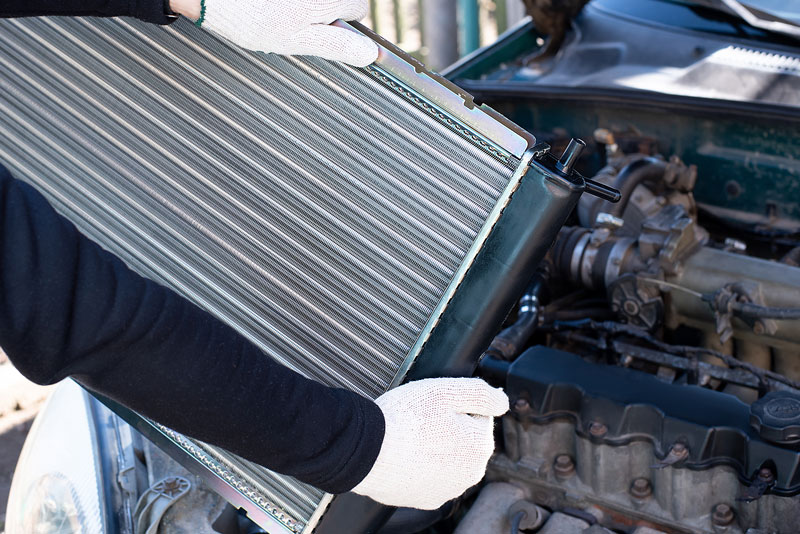
Most Common Type of Damage
While regular maintenance helps prolong the life of your car's AC condenser, it's still susceptible to certain types of damage. The most common issue is leakage, resulting from physical damage or corrosion. This can cause a loss of refrigerant, impairing the cooling system's ability to function correctly.
Condenser maintenance is vital in preventing this. Regular checks for signs of leakage or damage can save you from larger issues down the road. Another common problem is blockage within the system. Debris, dirt, or even a buildup of refrigerant oil can clog the condenser, affecting its performance.
Cooling system troubleshooting often uncovers these issues. It's important to keep an eye on your AC's performance and seek professional help if you notice any changes or problems.
How to Replace a Faulty AC Condenser?
So you've found a faulty AC condenser and you're ready to replace it. Let's break down this task into manageable steps: preparing your vehicle, understanding safety precautions, and walking you through the process step by step. By following this guide, you'll have your AC condenser replaced in no time.

Preparing the Vehicle
Before diving into the process of replacing a faulty AC condenser, it is crucial to prepare the vehicle properly to guarantee a smooth and safe procedure. Start by checking your AC system maintenance routine.
Have you been ensuring your car's cooling efficiency? A well-maintained AC system can prevent sudden condenser failures and enhance the overall performance of your vehicle air conditioning.
Next, approach DIY troubleshooting. Be sure to inspect the vehicle for any obvious issues before you start taking things apart. Remember, preparation is key when it comes to DIY projects. The better prepared you are, the smoother the process. Now that your vehicle is prepared, you're ready to tackle the task of replacing your faulty AC condenser.
Safety Precautions
Your safety should come first when you're about to replace a faulty AC condenser, so let's go over some precautions you need to take.
Here are some installation tips and maintenance guidelines to help you stay safe:
- Disconnect the power: Before starting any work on the AC, always disconnect it from the power source to prevent electric shocks.
- Use the right tools: Using incorrect or damaged tools can lead to accidents. Make sure you have the correct tools and they're in good condition.
- Wear protection: Protect yourself from possible injuries by wearing gloves and safety glasses.
- Follow instructions: Follow the manufacturer's instructions carefully. If you're unsure, consult a professional.
With these safety precautions, along with troubleshooting tips, your efficiency improvement in replacing a faulty AC condenser will be significant.
Step by Step Process
Having prepared the safety precautions, let's now guide you through the step-by-step process of replacing a faulty AC condenser. Start by disconnecting the power source to avoid any electrical hazard. Then, remove the AC condenser unit, taking care not to damage any surrounding parts. Remember, condenser maintenance is key to prolonging its life.
Next, install your new condenser, ensuring it's securely in place. Once done, reconnect the power source. Now, it's time for some troubleshooting tips. Check if your AC is cooling effectively. If not, recheck your connections.
If problems persist, seek professional help. This process might seem challenging, but with patience, you'll successfully replace your AC condenser. Keep up with regular maintenance and your AC will thank you!
DIY or Professional Help - Pros and Cons
When it comes to replacing your AC condenser, you've got two options: tackling it yourself or hiring a professional, and each option has its own set of pros and cons.
The DIY route can be a cost-effective choice if you're comfortable with maintenance work. You'll need a good installation guide and the right tools. However, mistakes can lead to more costs down the line.
Here are some pros and cons to keep in mind:
- DIY vs. Professional: DIY offers savings, but professionals bring expertise.
- Cost Comparison: Professional services cost more upfront, but DIY risks higher costs from errors.
- Maintenance Tips: DIY requires regular upkeep and skill; professionals handle this for you.
- Installation Guide: Important for DIY. Professionals have their own.
Consider these points carefully. Making the right choice can ensure a long-lasting, efficient AC system.
How to Prevent Condenser Damage?
To maintain your AC condenser in top shape, it's crucial to follow preventive measures and regular maintenance practices. Preventative maintenance isn't just about fixing issues, it's about stopping them before they start. Regularly cleaning and inspecting your unit can help identify potential problems early.
Troubleshooting tips include checking for blockages in the system that can cause overheating. Make sure there's adequate airflow around your unit, and keep it clear of debris. Overheating can cause significant damage. If your AC isn't cooling efficiently, it might be time for a professional inspection.
Conclusion
Replacing your car's AC condenser might seem like tackling Mount Everest, but with the right tools and a dash of patience, it's achievable. Just remember, this isn't a race - like a marathon, it's all about endurance.
By properly maintaining your AC system, you can avoid costly repairs and enjoy a cool, comfortable drive. So, buckle up and take the wheel of your car's health. Because, hey, we all know prevention is better than cure.
FAQs (Frequently Asked Questions)
How Long Does an AC Condenser Typically Last in a Car?
- You'll feel like you've hit the jackpot when your AC condenser lasts 10-15 years, thanks to regular condenser maintenance. However, be prepared, replacement techniques will be needed as nothing lasts forever.
Can a Damaged AC Condenser Affect the Overall Performance of the Vehicle?
- Yes, a damaged AC condenser can affect your vehicle's performance. Poor condenser maintenance can decrease air conditioning efficiency, causing your car to work harder, impacting fuel economy and overall vehicle function.
What Are Some Common Signs of a Failing AC Condenser?
- You'll notice signs of a failing AC condenser like reduced cooling, leaks, or strange noises. Regular condenser maintenance can help, but sometimes replacement alternatives might be necessary for a more efficient cooling system.
